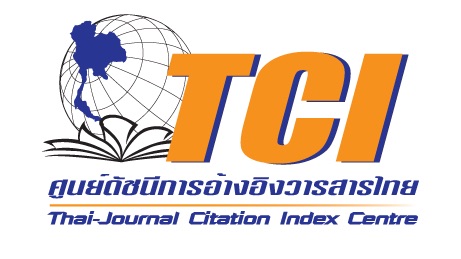The Development of a Training Program Based on Blended Learning for Enhancing OTOP Community Tourism Innovation Leader’s Competency on Using Information and Communication Technology
Keywords:
Training Program, Blended Learning, Potential of OTOP Community Tourism Innovation Leaders, Information and Communication Technology: ICTAbstract
The objectives of the research were 1) to develop training program based on blended learning for enhancing OTOP community tourism innovation leader’s competency on using ICT, 2) to study the efficiency of the developed training program, 3) to compare the potential of the community leaders under study by using ICT during and after the training, and 4) to investigate satisfaction of those participating in the training course. The samples used in the research were a total of 220 persons, that is, 10 leaders and members from 22 OTOP tourism communities. They were specifically randomized by purposive sampling. The research instruments used in the research were 1) a questionnaire on necessary potential and required training on ICT of the OTOP tourism community leaders, 2) an evaluation form on the training program, 3) a training program based on blended learning for enhancing OTOP community tourism innovation leader’s competency on using ICT, and 4) a questionnaire on the satisfaction of the participants in the program. Statistics used in the research were frequency, percentage, mean, standard deviation, efficiency index and T-test. The research findings were as follows. 1) The quality of the developed training program was overall at a high level ( = 4.35, S.D. = 0.46). 2) The effectiveness index of the developed training program was at 0.6948. 3) The potential of OTOP community tourism innovation leaders after the training were higher than before with a statistical significance at .05. 4) The participants in the training program had a satisfaction in the training course at a high level (
= 4.06, S.D. = 0.80).
References
ครองขวัญ รอดหมวน. (2561). พฤติกรรมผู้บริโภคยุคใหม่. https://www.thaipost.net/main/detail/15886
เฉลิม จักรชุม. (2559). การพัฒนาหลักสูตรฝึกอบรมตามแนวคิดการเรียนรู้แบบผสมผสาน เพื่อเสริมสร้างสมรรถนะของครูด้านการใช้เทคโนโลยีสารสนเทศและการสื่อสารในการจัดการเรียนรู้. วารสารมหาวิทยาลัยราชภัฏยะลา, 11(2), 129-143.
ชวลิต ชูกำแพง. (2559). การวิจัยและพัฒนาหลักสูตร: แนวคิดและกระบวนการ. สำนักพิมพ์แห่งจุฬาลงกรณ์มหาวิทยาลัย.
ทิวา เทียนเบ็ญจะ. (2561). การพัฒนาหลักสูตรฝึกอบรมเพื่อเสริมสร้างสมรรถนะในการยกระดับผลิตภัณฑ์กลุ่มชุมชนในเขตหนองจอก [ดุษฎีนิพนธ์ปริญญาปรัชญาดุษฎีบัณฑิต ไม่ได้ตีพิมพ์]. มหาวิทยาลัยรามคำแหง.
วิไลพร ไชยสิทธิ์, ดาราวรรณ ญาณะนันท์, สถาพร จะนุ, อดิศักดิ์ โฮนอก, และอาณัติ หน่อทองคำ. (2561). การพัฒนาหลักสูตรฝึกอบรมด้านเทคโนโลยีสารสนเทศเพื่อส่งเสริมผลิตภัณฑ์ชุมชนท้องถิ่นในจังหวัดราชบุรี : แบบชุมชนมีส่วนร่วม. มหาวิทยาลัยราชภัฏหมู่บ้านจอมบึง.
ศูนย์วิจัยเศรษฐกิจ ธุรกิจและเศรษฐกิจฐานราก ธนาคารออมสิน. (2561, 23 กุมภาพันธ์). การท่องเที่ยวชุมชน. http://www.elfhs.ssru.ac.th/kankanith_ku/pluginfile.php/390/mod_resource/content/1/GR_report_travel_internet_detail.pdf
สำนักงานพัฒนาชุมชนจังหวัดศรีสะเกษ. (2563, 21 กุมภาพันธ์). ชุมชนท่องเที่ยว OTOP นวัตวิถี. https://sites.google.com/view/otopsisaket
สำนักงานปลัดกระทรวงการท่องเที่ยวและกีฬา. (2563). COVID-19 กับผลกระทบต่อการท่องเที่ยวไทย : สถานการณ์การท่องเที่ยวของประเทศไทยไตรมาส 1/2563. วารสารรายงานภาวะเศรษฐกิจการท่องเที่ยว Tourism Economic Review, 1(4).
สุรศักดิ์ ปาเฮ. (2560). กระบวนทัศน์เทคโนโลยีการศึกษาในยุคดิจิทัล. แพร่: แพร่ไทยอุตสาหกรรมการพิมพ์.
อรุณรุ่ง โยธสิงห์. (2559). การพัฒนาหลักสูตรฝึกอบรมตามแนวคิดการเรียนรู้แบบผสมผสาน เพื่อเสริมสร้างสมรรถนะด้านการประเมินที่เน้นผู้เรียนเป็นสำคัญ ของครูผู้สอนระดับประถมศึกษา. [วิทยานิพนธ์ปริญญาปรัชญาดุษฎีบัณฑิต ไม่ได้ตีพิมพ์]. มหาวิทยาลัยราชภัฏสกลนคร.
Saylor, J.G., Alexander, W.M. & Lewis, A.J. (1981). Curriculum Planning for better Teaching and Learning. (4th ed). New York: Holt, Rinehart & Winston.
The Bangkok Insight Editorial Team. (2563, 23 สิงหาคม). เจาะลึก 10 เทรนด์พฤติกรรมผู้บริโภคยุคดิจิทัลในอนาคต เกิดขึ้นไวกว่าคาดถึง 5 ปี. https://www.thebangkokinsight.com/416756/
Downloads
Published
How to Cite
Issue
Section
License

This work is licensed under a Creative Commons Attribution-NonCommercial-NoDerivatives 4.0 International License.







